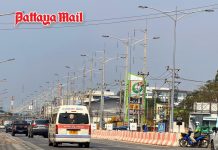
PATTAYA, Thailand – Once a bustling magnet for massive tour groups from China, Pattaya’s beaches, malls, and nightlife zones are noticeably quieter. The sight of Chinese tourists in matching hats following guides with megaphones used to be a daily norm. Now, it’s a rarity — and the absence could mark the end of an era for one of Thailand’s most tourism-dependent cities.
While some might celebrate the calm, not everyone is smiling. Local vendors, transport operators, and hotel owners are seeing revenue dip sharply, and industry observers worry that without serious reforms, Pattaya may struggle to reclaim its place on the Chinese travel map.
Tourism analysts say Chinese travelers — especially families and seniors — now see Pattaya as unsafe and chaotic. Incidents like the recent early-morning brawl between Thai women on Walking Street, caught on video and circulated on Chinese social media, are reinforcing a negative image of the city. Combined with growing competition from cleaner, better-organized destinations like Da Nang, Singapore, and Osaka, Chinese travel agencies are quietly removing Pattaya from preferred tour packages.
But the shift may also start affecting Pattaya’s long-term Western visitors.
European tourists — especially those who visit Pattaya for months at a time during the winter — are beginning to grumble. Without the stabilizing force of mass tourism, some say prices for food, transport, and rentals haven’t come down as expected. Instead, in some areas, prices have risen — possibly as businesses try to offset the drop in Chinese spending. “We used to joke about noisy Chinese buses,” said Dieter, a retiree from Germany who winters in Jomtien. “Now we kind of miss them — at least things were moving, and prices stayed competitive.”
The sentiment is echoed by British and Scandinavian travelers who say Pattaya feels like it’s in a confusing middle phase: not premium enough to compete with upscale resorts, but no longer as budget-friendly or vibrant as it once was.
City officials are scrambling to reverse the decline. Deputy Mayor Wuttisak Rermkijjakan has convened high-level meetings with police, municipal officers, and tourism stakeholders to boost public safety and restore confidence. Plans are underway to improve signage, reduce street crime, and introduce more traffic enforcement in tourist-heavy zones.
Still, without bold structural changes, many fear the efforts may be too little, too late. “Pattaya needs to decide what kind of city it wants to be,” said a Bangkok-based tourism analyst. “Right now, it risks losing both mass Chinese tourism and loyal European visitors — and keeping neither.”
For now, Pattaya’s once-dependable Chinese tourist herds remain a memory. Whether they return — and whether European visitors stay — depends on the choices the city makes in the coming months.










